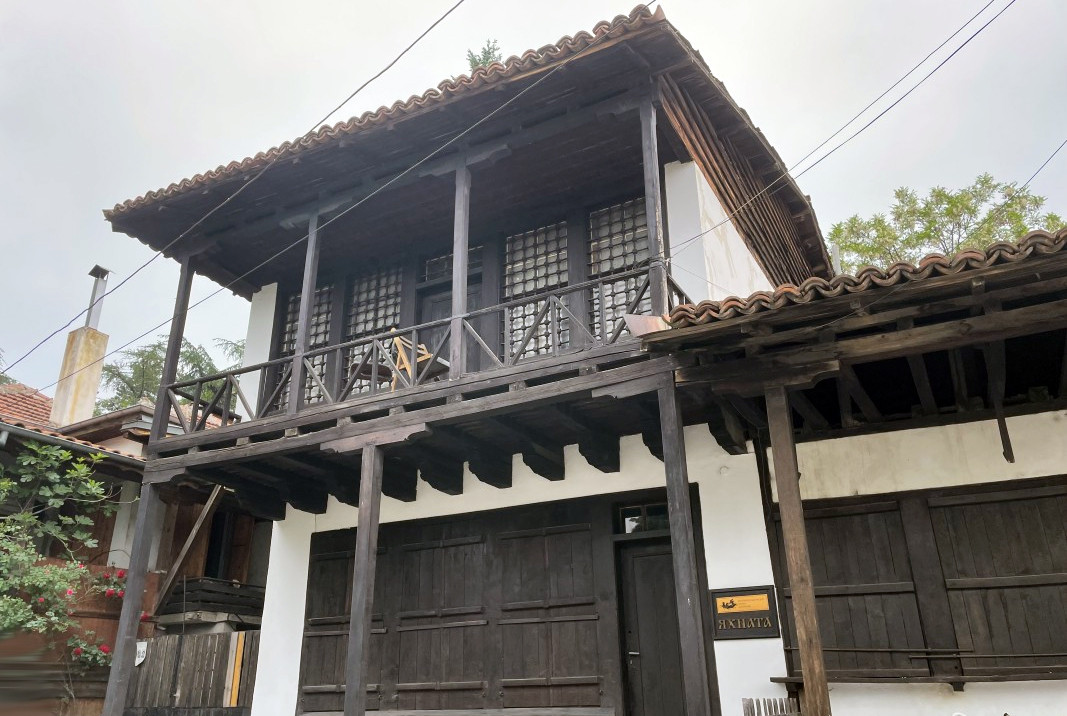In the region of Kazanluk, an area known for the growing of oleaginous roses and the production of rose oil, sharlan or sharlagan (walnut oil) was something that could be found in every home. People would use walnut oil as food, but also for lighting. Making walnut oil, or yahnadzhiistvo in Bulgarian, was very widespread, and in Enina village near Kazanluk, it was a family occupation over many generations.

The olive oil imported from Asia Minor and Greece was very expensive, that is why alongside the fulling-mills and water-mills typical of the mountain regions, the enterprising people of Enina built yahnadzhiinitsi (walnut oil mills) along the village river. In time, the walnut sharlan made its way to big town markets and even crossed over into other countries. However, the spread of sunflower oil gradually smothered the craft of yahnadzhiistvo.

By accident or design, at the start of the pandemic in 2020, the art of walnut oil making made a comeback, thanks to the Iskra Museum of History in Kazanluk.
“It is an occupation that it typically Bulgarian, yet we do not readily connect it with Bulgaria, even less so with the Valley of Roses,” Momchil Mladenov, Director of the Museum of History in Kazanluk says in an interview with BNR-Stara Zagora.

“From the time of the National Revival, the region of Kazanluk was studded with walnut tree groves. They were so impressive that foreign travelers would marvel at the tree-giants, calling them “nightingale palaces”. There are photographs that have come down to us showing just how majestic they really were. The nuts these trees grew were of exceptional quality.”

To begin with, the technology of extracting walnut oil was entirely by hand, starting with the selection of the best nuts, which were baked inside an oven, then pressed between two planks which were fixed at one end and squeezed by hand at the other.

As the oil extraction was very labour consuming, the villagers started using mill-stones to crush the nuts. They were set in motion by donkeys or horses, but then they started using water, as in water mills. The walnuts, ground to a fine dust, were poured into a vat and water was added. The mixture was boiled until it thickens and then poured into woolen sacks, which, when pressed, allowed the oil to seep out.

The mixture that remained was used to make walnut tahini. To keep it from spoiling until the next walnut season, the oil was kept in jars, buried in the ground. Once this craft grew, sharlan makers from Enina started building walnut oil mills over a large portion of Southern Bulgaria, the biggest workshops being in Stara Zagora, Kazanluk and in Pazardzhik. After the country’s liberation in 1878, they built one of the biggest and most highly reputed yahnadzhiinitsi in Sofia.

“For us it very important, and it is to some extent a challenge, as a museum and from a culturological point of view, to trace this process in terms of the economy and the way small-scale family entrepreneurship developed – which it did, and spendidly. But after sunflower oil entered the picture, many of the walnut oil mills were converted and started producing sunflower oil which is not as labour intensive as walnut oil. Oil producers had a very keen sense of the market, always on the lookout for the niche worth developing.”

The craft of rose oil and sharlan oil making was complementary – in spring the villagers would grow roses and in autumn and winter – walnuts, making sure there was enough manpower for both. Just as in rose production, which was passed down from generation to generation, the craft of yahnadzhiistvo was a prestigious occupation for many families, some of which have taken the word as their surname, and are proud of it.
Interview by BNR-Stara Zagora
Compiled by Darina Grigorova
Photos: "Iskra" History Museum – KazanlukThe Bulgarian Land Forces are celebrating their holiday today. A statement from the Ministry of Defense's press center notes that November 19, 2024 marks 139 years since the glorious victory at Slivnitsa and 146 years since the establishment of..
The book "Ten Great Friends of Bulgaria" by journalist Milena Dimitrova will be presented this evening at 6pm at the Sts. Cyril and Methodius National Library in Sofia. The book recounts the lives of ten people of different nationalities and eras, whose..
The Getty Museum in Los Angeles, USA, is hosting a webinar today entitled Who Were the Thracians? Professor of Classical and Ancient History Matthew Sears will discuss the Thracian legacy and its influence on ancient Athens. Sears is the author of..
On November 30, the Bulgarian Orthodox Church honors the memory of St. Apostle Andrew . In Bulgaria the saint is known as Saint Andrey and the folk..

+359 2 9336 661
